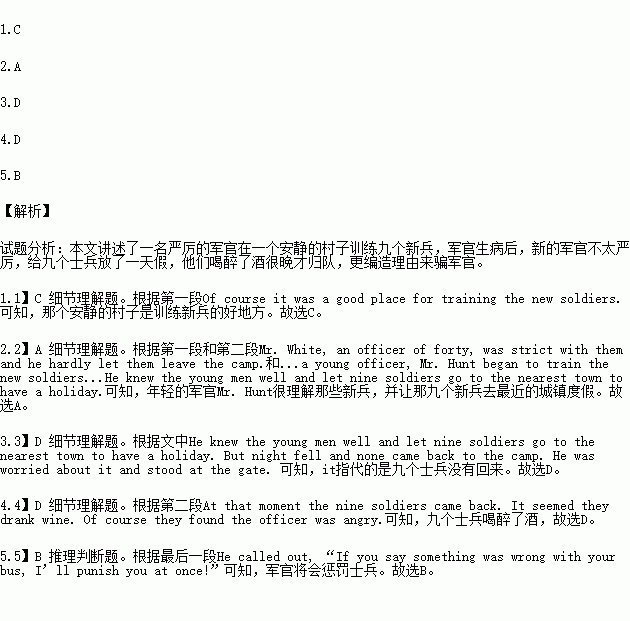题目内容
It was a quiet village in which there was a military camp(军营). It was far from the towns and cities and there were some high mountains around. Of course it was a good place for training the new soldiers. But it was difficult for the young men to go outside. Mr. White, an officer of forty, was strict with them and he almost never let them leave the camp.
Once Mr. White was ill in bed. He couldn’t work and a young officer, Mr. Hunt, began to train the new soldiers instead of him. He knew the young men well and let nine soldiers go to the nearest town to have a holiday. But night fell and none came back to the camp. He was worried about it and stood at the gate. It was five to twelve when Mr. Hunt decided to go to the town and see what was happening with the young men. He started the car quickly and set off. At that moment the nine soldiers came back. It seemed they drank wine. Of course they found the officer was angry.
“I’m sorry, sir,” said the first soldier. “I left the town on time. But something was wrong with my bus on my way here. I had to buy a horse and made it run fast. Bad luck! It died and I had to run back.”
And the other seven soldiers said they were late for the same reasons. It was the last soldier’s turn. He said, “I’m sorry, sir. I got on a bus on time, but...”
Having heard this, the officer became even angrier and stopped him at once. He called out, “If you say something was wrong with your bus, I’ll punish you at once!”
“No, no, sir,” said the young man. “My bus was all right, but the dead horses were in its way!”
1.The military camp was built in the village to _______.
A. stop the soldiers going to towns
B. stop the soldiers meeting their friends
C. train the new soldiers
D. make the young men live quietly
2.Mr. Hunt let the nine soldiers have a holiday because _______.
A. he was kind to them
B. they felt lonely
C. they had something important to do
D. they were the best of all
3.What does the underlined “it” mean?
A. Night came.
B. The nearest town.
C. The camp gate.
D. The nine soldiers didn’t come back.
4.The nine soldiers returned to the camp late because _______.
A. something was wrong with their buses
B. their horses died on the return way
C. it took them much time to run back
D. they all had drunk much in the town
5.What can be inferred from the story?
A. Only the last soldier told the truth.
B. The officer would punish them for their lies.
C. The nine soldiers would be punished but the last one.
D. The nine soldiers were honest.
 53随堂测系列答案
53随堂测系列答案

